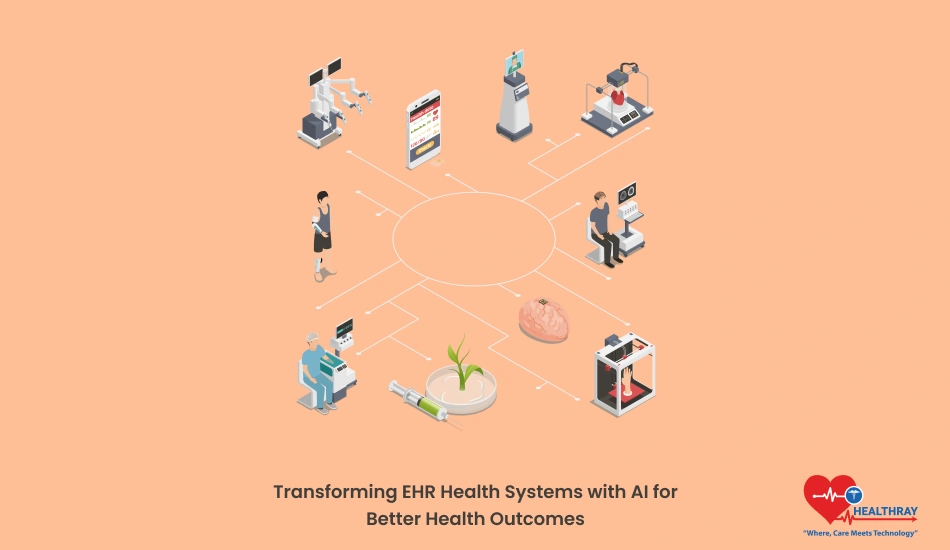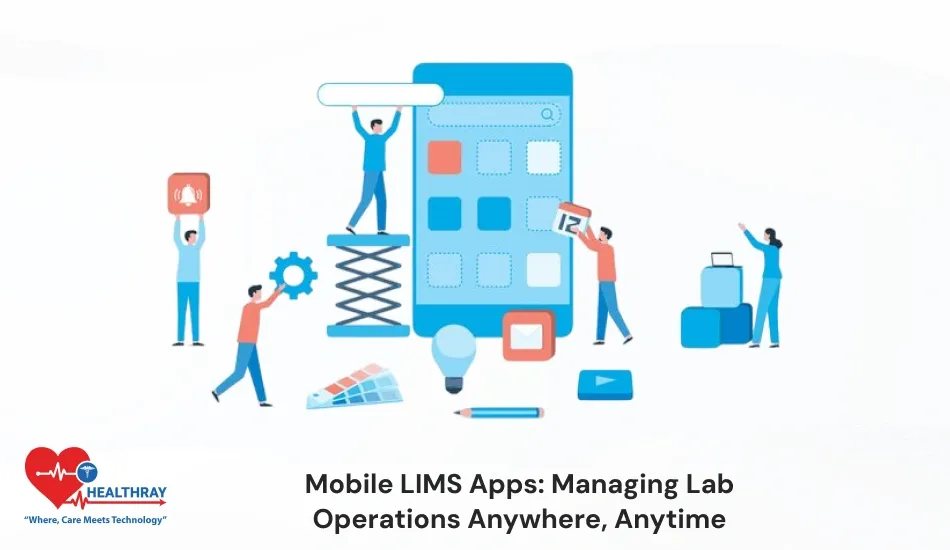Healthcare is evolving rapidly, and electronic health record (EHR) systems are at the heart of this transformation. Yet, despite their widespread adoption, many EHR systems fall short in delivering streamlined data management and actionable insights. That’s where artificial intelligence (AI) comes in, offering solutions to enhance the way healthcare providers access and utilize patient data.
Integration of AI into EHR systems can help transition from simple digital filing cabinets to dynamic tools that enhance decision-making, reduce administrative burdens, and raise the quality of patient care. This translates to more hours saved from mundane work and more hours spent on patients for healthcare providers. Improved operational efficiency for hospital administrators and a playground for innovating cutting-edge solutions for tech innovators are other benefits.
This post discusses the manner in which AI transforms EHR systems, eliminates present challenges, provides benefits to important stakeholders, and promotes intelligent health care outcomes.
The Current Challenges with Traditional EHR Systems

Electronic health record (EHR) systems were designed to simplify record-keeping and improve access to patient data. However, many traditional systems face significant challenges that hinder their full potential. These issues affect healthcare providers, administrators, and even patients, creating a pressing need for innovation.
Overloaded Systems and Inefficient Data Management
The traditional EHR systems are generally incapable of handling large volumes of patient data. This often causes delays in retrieving critical information, which slows down clinical workflows. In emergency situations, this inefficiency can be more than just inconvenient-it can impact the outcome of a patient.
Administrative Burden and Provider Burnout
Healthcare providers spend a substantial portion of their time navigating complex EHR interfaces. Tasks like data entry, note-taking, and order management take up hours that could be better spent on patient care. This contributes to burnout, a growing concern among medical professionals.
Lack of Actionable Insights
Although traditional EHRs hold tons of data, drawing fruitful insights is challenging. Without sophisticated tools, uncooked data from the records is not a practical determinant of trends or foreseeing outcomes. Typically, providers depend on other systems and analyze documents manually-an added burden to their work.
Interoperability Issues
EHR systems often struggle to communicate with one another. This lack of interoperability creates silos, where patient data is fragmented across multiple platforms. Coordinating care between departments or facilities becomes cumbersome, increasing the likelihood of errors or delays.
Patient Engagement Barriers
Traditional EHRs provide little opportunity for patient engagement in their care. Patient portals, a feature of many EHRs, are often underutilized because of poor user interfaces or limited functionality, leading to low engagement and satisfaction.
But these challenges go to show the shortcomings of traditional EHR systems. They also explain why integrating AI into them would not be mere technological improvement but indeed an evolutionary necessity for health.
How AI Transforms EHR Systems
Artificial intelligence is transforming electronic health record (EHR) systems by solving their basic problems and unlocking new possibilities. By exploiting such possibilities in the management of data, predictive analytics, and workflow automation, artificial intelligence is helping healthcare professionals deliver better care while optimizing operations.
Enhancing Data Management and Accessibility
AI excels at organizing and processing large volumes of information. In EHR systems, this means faster and more accurate retrieval of patient data. For example, AI-powered tools can parse unstructured clinical notes and organize them into easily accessible formats. This reduces the time spent searching for information and ensures that providers have what they need at their fingertips.
Interoperability is another area where AI shines. Machine learning algorithms can bridge gaps between disparate systems, enabling seamless data exchange. This ensures that providers can access complete patient histories, even when data originates from different platforms.
Predictive Analytics for Better Decision-Making
One of the most revolutionary capabilities of AI is in predictive analytics. By analyzing patient data, AI can predict health trends and outcomes. For example, algorithms can identify patients at risk of developing chronic conditions like diabetes or heart disease, and thus enable early interventions.
AI also supports clinical decision-making by analyzing patterns in diagnostic data. This helps providers make more informed decisions, ultimately improving patient outcomes. Predictive analytics turns raw EHR data into actionable insights, empowering healthcare teams to plan more effectively.
Automating Administrative Workflows
Administrative tasks are a significant burden in healthcare, but AI is reducing this load. Features like natural language processing (NLP) enable providers to dictate notes that AI systems transcribe and input directly into the EHR. This minimizes manual data entry and reduces errors.
AI also supports appointment scheduling, billing, and compliance reporting. Automating these processes frees up valuable time for providers and administrative staff, improving overall efficiency.
Personalizing Patient Care
AI-driven EHRs can deliver personalized care recommendations based on individual patient data. For instance, they can suggest treatment plans tailored to a patient’s medical history and current condition. This customization enhances patient engagement and satisfaction while supporting better health outcomes.
AI’s ability to transform EHR systems lies in its capacity to address inefficiencies while introducing innovative solutions. By integrating AI, healthcare providers, administrators, and innovators can leverage EHR systems that actively contribute to improved care and streamlined operations.
Benefits for Key Stakeholders
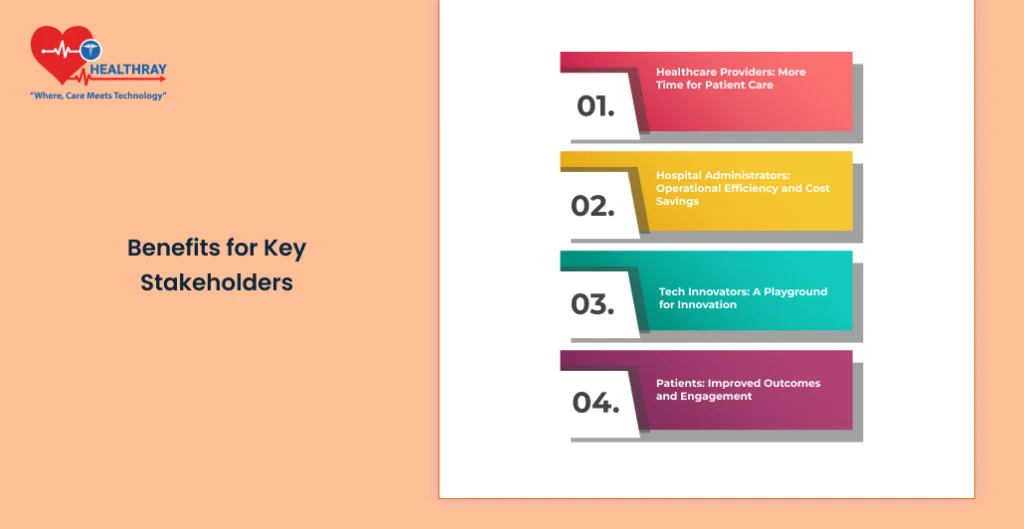
The integration of artificial intelligence (AI) into electronic health record (EHR) systems is not just a technological advancement—it’s a game-changer for the key stakeholders in healthcare. From easing the workload of providers to opening doors for innovation, the benefits are wide-reaching.
Healthcare Providers: More Time for Patient Care
AI assists providers by streamlining workflows and automation of routine tasks. An example is voice-to-text transcription and automated data entry to reduce hours spent on administrative functions. This enables physicians to spend more time on direct patient care, which enhances efficiency and satisfaction in both aspects.
AI supports clinical decisions through real-time patient data analysis. Its insights into risks, trends, and possible complications guide better-informed choices by providers, thereby enhancing precision in diagnosis and treatment outcomes.
Hospital Administrators: Operational Efficiency and Cost Savings
For administrators, AI-powered EHR systems translate into smoother operations and better resource management. Predictive analytics can forecast patient admissions, helping hospitals allocate staff and equipment more effectively. This reduces operational costs and prevents resource shortages during peak times.
Automation also streamlines compliance reporting and billing, minimizing errors and ensuring timely reimbursements. The reduction in manual tasks improves overall workflow, allowing hospitals to operate more efficiently.
Tech Innovators: A Playground for Innovation
AI-enabled EHR systems provide tech innovators with opportunities to push boundaries. Developers can create applications that integrate seamlessly with existing systems, improving functionality and usability. For instance, apps that analyze patient vitals in real time or monitor post-operative recovery enhance the value of EHR systems.
The rise of interoperable platforms also encourages collaboration between tech companies, healthcare providers, and administrators. This synergy drives innovation, resulting in smarter, more adaptive systems.
Patients: Improved Outcomes and Engagement
Although not typically seen as a stakeholder in EHR systems, patients benefit significantly. AI enhances care quality by ensuring their health data is accurate, up-to-date, and actionable. Personalized care plans and real-time monitoring lead to better outcomes.
Patient engagement also improves with AI-driven tools like chatbots and user-friendly portals. These systems simplify scheduling, provide reminders, and offer access to medical records, making healthcare more accessible and interactive.
By addressing the unique needs of each stakeholder, AI-driven EHR systems deliver value across the board. This transformative technology is not just solving current challenges but also setting the stage for a more connected and efficient healthcare ecosystem.
Challenges in Integrating AI with EHR Systems
While the integration of artificial intelligence (AI) into electronic health record (EHR) systems offers numerous benefits, it also comes with a unique set of challenges. These hurdles must be addressed to ensure seamless adoption and functionality without compromising patient care or data security.
Technical Barriers
EHR systems mostly run on legacy infrastructure that may not support modern AI algorithms. Upgrades can be expensive and time-consuming. Another challenge is the interoperability of different EHR platforms. AI models need consistent and high-quality data, but fragmented systems usually result in incomplete or inaccurate datasets.
Data Privacy and Security Concerns
AI relies heavily on patient data to generate insights. This dependence raises concerns about data privacy and security. The risk of unauthorized access, data breaches, and misuse of sensitive information poses a critical challenge for healthcare organizations. Strict adherence to regulations like HIPAA is essential, but compliance alone is not always enough to prevent threats.
Ethical Considerations
The use of AI in EHRs brings up ethical questions, particularly around algorithmic bias. AI systems can unintentionally reflect and perpetuate biases present in their training data, potentially leading to unequal treatment recommendations. Healthcare providers and administrators must work to ensure fairness and transparency in AI-driven decision-making.
Resistance to Change
Healthcare providers and staff often face steep learning curves when adopting new technology. Resistance to change is common, especially in environments where time is already stretched thin. Effective training programs and clear demonstrations of AI’s value are essential to overcoming this resistance.
High Implementation Costs
Implementing AI in EHR systems can require substantial upfront investment in software, hardware, and training. While long-term benefits often outweigh these costs, the initial financial burden can deter smaller healthcare organizations from adopting AI solutions.
Unclear Regulatory Landscape
AI in healthcare is still evolving, and regulations surrounding its use in EHR systems are not always well-defined. Navigating the regulatory landscape can be complex, with organizations needing to ensure compliance with both local and international standards.
Strategies to Overcome These Challenges
- Foster Collaboration: Encourage partnerships between healthcare providers, tech innovators, and regulatory bodies to address interoperability and compliance issues.
- Focus on Training: Invest in user-friendly AI interfaces and comprehensive training to ease the transition for healthcare staff.
- Emphasize Security: Use advanced encryption and security protocols to protect patient data and build trust among stakeholders.
- Plan Strategically: Start with small-scale AI implementations, measure results, and scale gradually to minimize risk and cost.
While these challenges may seem daunting, they are not insurmountable. By addressing these issues head-on, healthcare organizations can unlock the full potential of AI in EHR systems, paving the way for a smarter and more efficient healthcare landscape.
Case Studies of AI-Enhanced EHR Systems
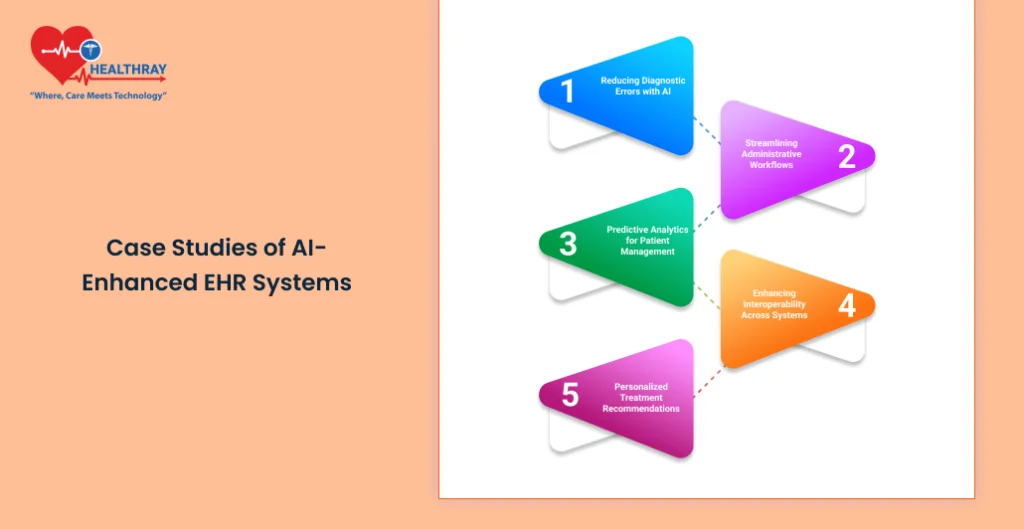
Real-world examples of AI integration in electronic health record (EHR) systems showcase the transformative potential of this technology. These case studies highlight how AI is addressing challenges and delivering tangible benefits across healthcare settings.
Reducing Diagnostic Errors with AI
A large healthcare network implemented an AI-powered EHR tool to assist physicians in diagnosing complex medical conditions. By analyzing patient histories, lab results, and clinical notes, the AI provided evidence-based diagnostic suggestions. This system reduced diagnostic errors by 30% within the first year, leading to faster and more accurate treatments for patients.
Key Takeaway: AI can enhance decision-making by providing real-time, data-driven insights that complement a physician’s expertise.
Streamlining Administrative Workflows
A regional hospital adopted natural language processing (NLP) technology to automate transcription and data entry into their EHR software Physicians used voice commands to input clinical notes, which the AI accurately converted into structured data. This reduced documentation time by 40%, allowing providers to spend more time with patients.
Key Takeaway: Automating repetitive tasks with AI can alleviate administrative burdens, improving efficiency and provider satisfaction.
Predictive Analytics for Patient Management
A hospital specializing in chronic disease care used AI-driven predictive analytics to identify patients at risk of readmission. The system analyzed EHR data, including medication adherence and previous hospitalization records, to flag high-risk patients. With early interventions, the hospital reduced its readmission rates by 25% within six months.
Key Takeaway: Predictive analytics powered by AI can help healthcare providers proactively manage patient care and improve outcomes.
Enhancing Interoperability Across Systems
A multi-facility health system integrated an AI-based platform to bridge gaps between disparate EHR systems. The AI tool enabled seamless data exchange between departments and external care providers, ensuring that all stakeholders had access to complete patient information. This improvement streamlined care coordination and reduced duplicate testing by 15%.
Key Takeaway: AI-driven interoperability solutions can eliminate data silos, improving the flow of information and reducing inefficiencies.
Personalized Treatment Recommendations
An oncology center incorporated an AI system into its EHR to provide personalized treatment plans for cancer patients. By analyzing genetic data and medical histories, the AI suggested targeted therapies tailored to each individual’s needs. This approach improved treatment success rates and patient satisfaction significantly.
Key Takeaway: AI integration enables precision medicine by delivering tailored treatment recommendations based on comprehensive data analysis.
These case studies demonstrate the real and measurable impact of AI on EHR systems. From improving diagnostic accuracy to enhancing operational efficiency, these successes highlight the potential of AI to revolutionize healthcare delivery.
Future Trends in AI and EHR Integration
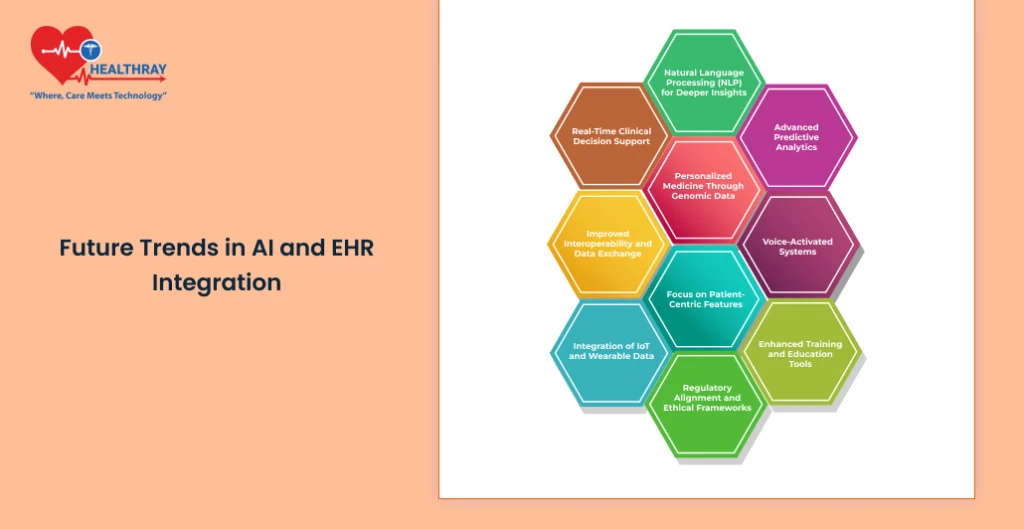
The integration of artificial intelligence (AI) into electronic health record (EHR) systems is only the beginning. Emerging trends are poised to take this technology even further, reshaping healthcare in ways that were once unimaginable. Here are the key advancements to watch for in the coming years.
Natural Language Processing (NLP) for Deeper Insights
With further development of NLP, AI is going to learn the unstructured data such as physician notes, patient feedback, and clinical summaries. Future EHR systems will be capable of using NLP in order to get meaningful insights out of the data, understand better what patients want, and enhance documentation accuracy.
Real-Time Clinical Decision Support
Next-generation EHR systems will use AI to provide real-time decision support during patient care. These systems will integrate tools that analyze patient data on the fly, offering actionable recommendations directly within clinical workflows-suggesting treatments, flagging drug interactions, or identifying potential complications.
Advanced Predictive Analytics
Predictive analytics will become even more precise with advancements in machine learning. Future AI-driven EHRs will not only identify at-risk patients but also recommend personalized intervention strategies. These systems may predict long-term outcomes like disease progression, improving preventive care.
Personalized Medicine Through Genomic Data
As genomic data becomes more accessible, AI will play a crucial role in integrating this information into EHRs. Providers will be able to offer highly personalized treatments based on an individual’s genetic makeup, moving toward a more precise and effective approach to care.
Improved Interoperability and Data Exchange
AI will drive more seamless data sharing between EHR systems, ensuring interoperability across providers, hospitals, and healthcare networks. Blockchain technology combined with AI may enhance data security and enable patients to have greater control over their health information.
Voice-Activated Systems
Providers’ interaction with EHR systems will evolve with the rise of voice-enabled AI assistants. It is more likely that voice commands would streamline entry, retrieval, and even managing tasks, thus enabling providers to interact with technology more naturally and efficiently.
Focus on Patient-Centric Features
AI-powered EHR systems will increasingly focus on improving patient engagement. Features such as AI chatbots, predictive appointment scheduling, and personalized health reminders will make healthcare more accessible and interactive for patients, fostering stronger relationships between patients and providers
Integration of IoT and Wearable Data
The Internet of Things (IoT) and wearable health devices are generating vast amounts of real-time data. Future EHR systems will integrate this data, offering providers a comprehensive view of a patient’s health. AI will analyze trends from wearable data to provide insights into lifestyle factors and early warning signs.
Enhanced Training and Education Tools
AI-driven EHR systems will incorporate tools for training healthcare professionals. Simulated scenarios and interactive guides will help staff learn new features quickly and efficiently, ensuring smooth adoption of advanced systems.
Regulatory Alignment and Ethical Frameworks
Future of AI in EHRs will be about stronger regulatory standards and ethical guidelines. This framework is supposed to address problems like algorithmic bias, data security, and accountability to generate trust among the users and stakeholders.
These trends will continue to unravel the role of AI in EHR systems from a support tool to a transformative force in healthcare. Organizations that embrace these early will be better placed to lead the way in delivering smarter, more personalized care.
Conclusion
The integration of artificial intelligence (AI) into electronic health record (EHR) systems is revolutionizing how healthcare is delivered and managed. By addressing long-standing challenges like data overload, inefficiency, and interoperability, AI is transforming EHRs into tools that actively enhance patient care, streamline workflows, and empower healthcare providers.
For the healthcare providers, this translates to less administrative work and more time on the patient. Hospital administrators benefit from cost savings and efficiency in operations, while for the innovators in the tech industry, there’s always scope for innovation to push the boundaries and innovate solutions.
Challenges remain, although these include data security, interoperability, and ethical considerations. The potential of an AI-driven Hospital Management System offered to healthcare organizations depends on strong strategies and partnerships.
Looking forward, advancements such as real-time clinical decision support, personalized medicine, and enhanced interoperability promise to make these systems even more impactful. AI isn’t just a tool for managing healthcare—it’s a catalyst for better health outcomes and a smarter, more connected healthcare ecosystem.
The time to embrace AI in EHR systems is now. Doing so would mean that healthcare stakeholders are always ahead of the curve, delivering better care and outcomes for all those involved.
